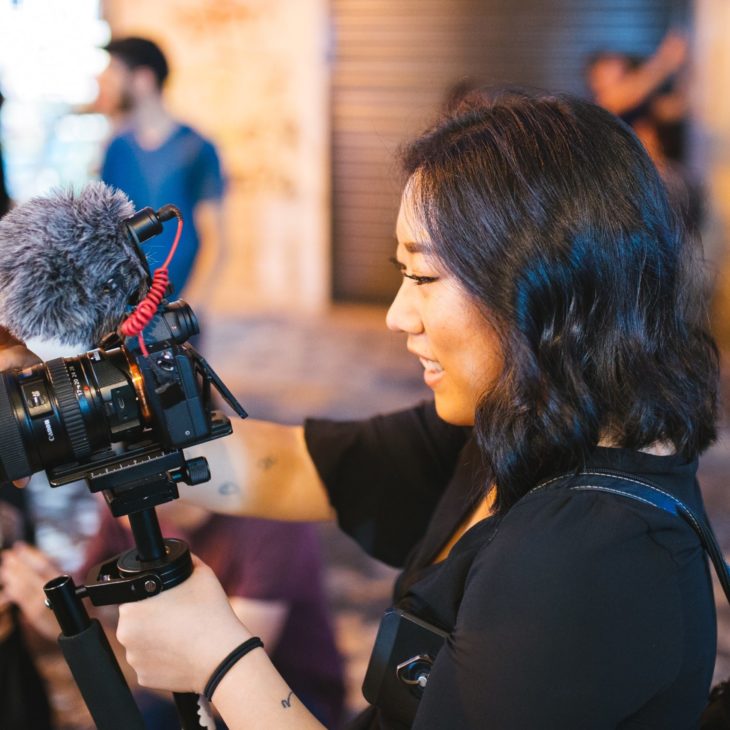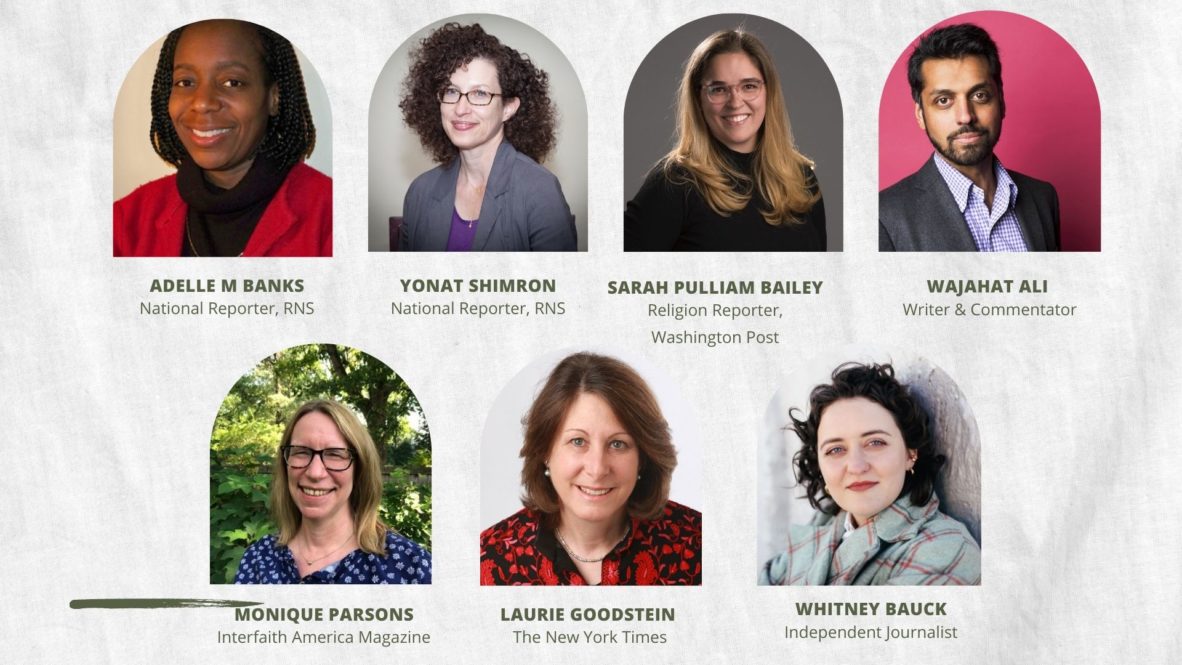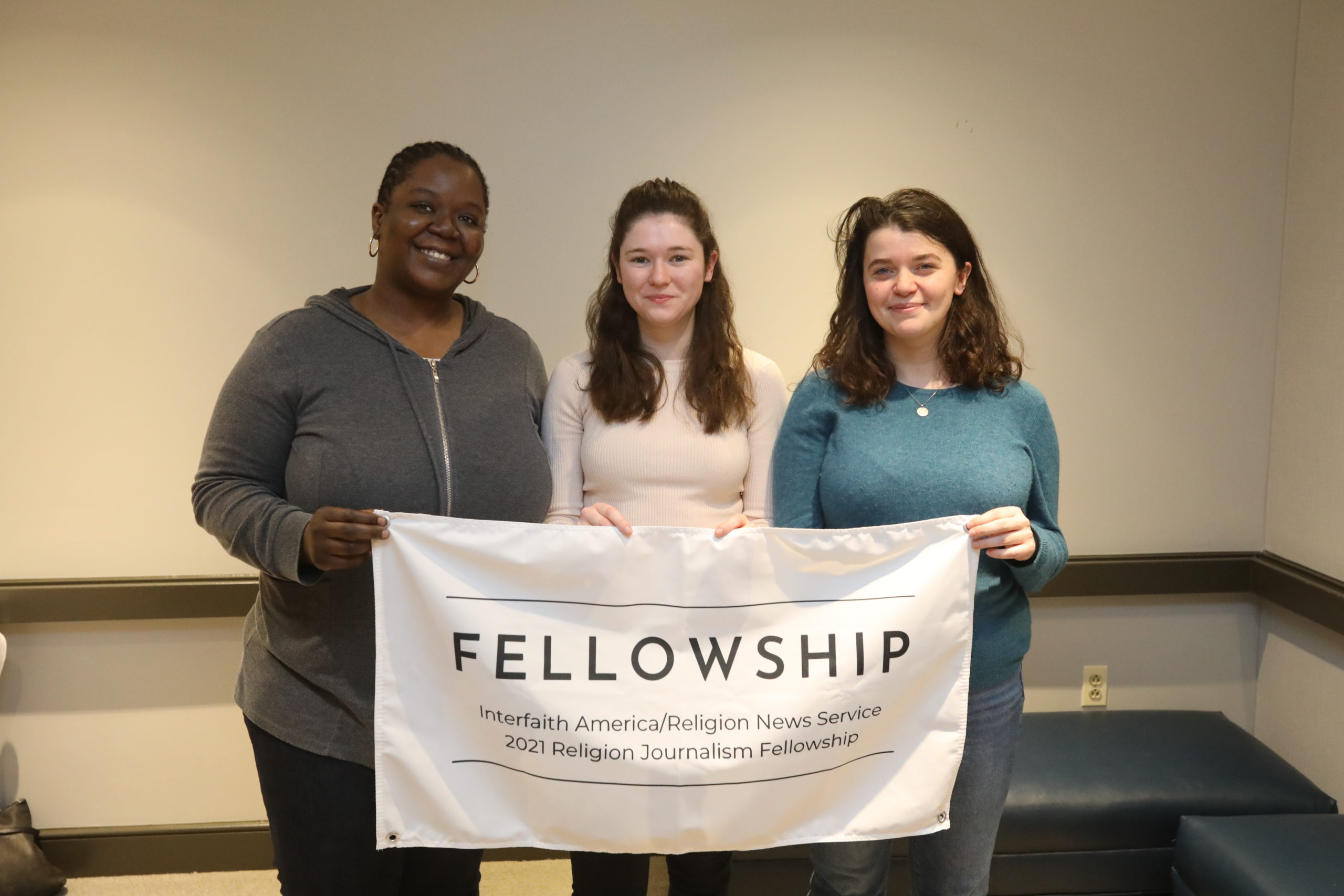Seven Religion Reporters Share Advice for Reporting in Interfaith America
May 25, 2022

The United States is one of the most religiously diverse democracies in the history of the world. Religion reporters play a crucial role in highlighting stories that make up our interfaith America. Storytelling about religion can mean covering religious holidays and sacred rituals, documenting the biases and prejudices that minority religious groups face, and highlighting ways that faith communities come together to work side by side for projects in their community. As demographics of the United States changes, so does our religious make up, and so will the stories we tell.
To explore the dynamic field of religion journalism, Religion News Service and Interfaith America Magazine editorial teams invited several of the nation’s finest religion reporters and commentators to speak as a part of the 2021-22 RNS/Interfaith America Religion Journalism Fellowship.
The six veteran Jounalists shared wisdom on religion reporting, the challenges they face, their trade secrets, and lessons from their careers.
Below are excerpts from those conversations with Yonat Shimron and Adelle Banks of Religion News Service; Laurie Goodstein of The New York Times; Whitney Bauck, Independent Journalist; Sarah Pulliam Bailey of The Washington Post; Wajahat Ali; and Monique Parsons of Interfaith America Magazine. They have been edited for clarity and length.
Share
Related Articles

How did you get into religion reporting?
I see it as a way of writing about something that’s important to people. It can fit anywhere, on the front page, the sports section, the business section, the style section, and the food section. I often tell people that I consider it to be a “religion and fill in the blank” situation. In music, sports, science, theater, or race, I could find the religion angle. It’s a great beat – it can be a challenge because you can’t cover everybody, but you do the best you can.
Adelle M. Banks , National Reporter, RNS Years ago, when people wrote about my religion, which is Judaism, it didn’t sound quite right. I want my writing to feel authentic to the people in that community. And so, my bit of advice for new religion reporters would be to go with what you know, build on that, and study and read as much as you can about traditions you don’t know. This is a really exciting time to write about religion because so much is changing.
Yonat Shimron , National Reporter, RNS I was working as a news assistant at the New York bureau of The Washington Post, and they gave me the opportunity to write whatever I could. So, I wrote for almost every section of the paper, and having done a few stories that touched on religion, I knew that I was interested in it. I was curious and it left me feeling like there’s a lot that I don’t get, it’s vast, it’s in every community, and it’s what makes this country tick.
Laurie Goodstein , The New York Times I didn’t study journalism or go to a journalism school, but after I graduated high school some of my early writings were on religion and those were some of my big feature pieces. Later, when I started working for Fashionista in New York, with my background in religion I was paying attention to the convergence of religion and fashion, and it allowed me to see something unique in the stories I was pitching and enabled me to break those stories before anyone else did.
Whitney Bauck , Independent Journalist
How do you authentically tell stories about other faiths you are not familiar with?
It just takes good reporting, and also allowing people to define their faith for themselves, not assuming that you know better, or that the accepted wisdom is that this faith is so and so. Hear what people are saying; see them as the authorities for how their faith should be represented. Verify things with people, and don’t be afraid to go back to people and to double-check on things. Don’t be afraid to ask questions, even the silliest one or what might be trifling to you or seem silly. Ask those questions.
Yonat Shimron , National Reporter, RNS I come at it like, “If I were a Washington Post reader, what’s relevant here? What do I need to know?” I think the best stories don’t come from my personal [opinion], they come from gleaning the most from the person that I’m interviewing on the topic. It comes from the best research, the best set of information, set of details, the good writing. It’s not that your personal opinion doesn’t matter. It does matter. But you’re sort of changing your role, right? Like you’re an investigator, you’re almost like a scientist.
Sarah Pulliam Bailey , Religion Reporter, The Washington Post I always did a lot of reading beforehand. When I was going to write about a community, I’d order all the books I could find, and it’s not like I read them all, but the research helped me ask better questions that went that extra step. It helped me be respectful of the space I was in, and to not get in the way.
Laurie Goodstein , The New York Times It’s about seeing the type of conversations and building the trust and relationships where Muslims are comfortable – and I am talking about Muslims, but this can go for any group. What are the conversations that these communities are having in the WhatsApp groups that they’re not having out loud? Can you extract those conversations for a mainstream audience? That means you’ve built up trust, that means you have communities that you’ve invested time in and that gives you the nuance. That gives you the story that no one else is writing about because you put in the work to dig deeper as a reporter to get to know the community and the stories that are important to them.
Wajahat Ali , Writer and Commentator There was a time when it was hard to be a fly on the wall in rooms you were not necessarily invited into. But with social media, you can listen in on different communities having conversations among themselves, but in a public forum. It has helped me write and edit sensitive topics about diverse faiths where I really want to make sure I didn’t get anything wrong, and so I think surrounding yourself with as many resources as you can is important.
Whitney Bauck , Independent Journalist
How has the religion reporting landscape changed over the years in America and how does it affect your storytelling?
One big change is that people no longer have to turn on the radio or tune into the TV to get their news – everything is coming from everywhere, unfiltered at all times. That makes our jobs different today. I think in some ways our jobs are helping people understand what voices are important, what themes are important, what matters and unpacking it for people. Because it is really a confusing world out there and people are getting lots of information from lots of sources and not knowing how to interpret it. The job now is curating and interpreting what’s already out there.
Laurie Goodstein , The New York Times I spend less time thinking about how religion reporting is changing, and more on trying to convince people in the New York media bubble that religion is important. We should pay attention to it because it’s shaping how politics play out, it’s shaping how relationships play out, it’s impacting things from the macro to the micro. Understanding how religion has moved through history, and the role it plays in the world today, is crucial for understanding how much it is shaping life in America right now. I feel like it’s still a narrative that’s very under explored and there are very few people doing it well.
Whitney Bauck , Independent Journalist I look at the most recent religion surveys and it seems young people are approaching religion in a really different way than our generations were. As America is getting more secular, there are parts of the world that are getting more religious, and I think that makes for really interesting global implications, especially with globalization. I don’t know how this changing landscape will affect the day-to-day role of a religion journalist, but I try to take it one step at a time with what’s the next thing that’s in front of me. A few years from now maybe the religious leaders we write about will be TikTok influencers, or bloggers, and a few years from then, it will be something else entirely – religion news is constantly evolving.
Sarah Pulliam Bailey , Religion Reporter, The Washington Post In addition to the different faith groups, today there’s also a greater acknowledgement of those who are not a part of organized religion, including agnostics, atheists, and freethinkers. There are public officials who identify as people of faith and people of no faith, and I think that’s something to quote them on because they’re acknowledging the breadth of our diverse country as far as it relates to faith. So there’s a lot more people to write about and that’s one of the changes I am seeing.
Adelle Banks , National Reporter, RNS People today are far less inclined to remain in the faith traditions they grew up with, the number of people leaving their religion is becoming bigger and bigger each year in America, and we are increasingly covering people who may dip their toes in more traditions than one. So, learning how to cover religion outside the institutional setting is a challenge for religion reporters. But I think that means we have to double down on how to learn more about these different faith traditions, how to access the people in the community and write about their stories, there’s so much more to learn out there.
Yonat Shimron , National Reporter, RNS The story of American religious life is only growing, and I have always found it an interesting story to tell. The rise of the religious “nones” is an important story to tell, and I think the story is more nuanced than it sometimes gets told, because there’s so much diversity [in that group]. As time has gone by, I have seen a greater appreciation and understanding of the landscape of Islam in America, as well as African American religions – and I don’t think you can understand American religion at all without having appreciation for these stories and having new voices tell these stories.
Monique Parsons , Managing Editor, Interfaith America Magazine
How do you pitch religion stories and convince editors and outlets that it’s important to cover?
I think it can be frustrating, it can be a setback, when you can tell this person’s not getting the importance of your story. But I also think you can leverage it as a strength of being like, “Hey, here’s how this connects to this other thing you’ve already done,” or that I know your publication is already interested in. Because you’ve covered this, this and this, let me show you this sort of unique angle or interesting way into the conversation. And I feel like that’s a lot of what my work has been trying to say, I’m seeing these like unique overlaps because I pay attention to both of these worlds. I [tell the editor], I can tell that you don’t have someone who has that perspective. And I want to bring that to you. So, it’s not to say that you nail it every time. But I do think there are a lot of editors where if you can show them that I am bringing you a perspective that you don’t have, you can really sell that as a benefit.
Whitney Bauck , Independent Journalist You have to assume the same for your editors as you do for your readers, which is that they are non-conversant and that they know nothing. Higher up in your pitch you have to get into the “why” of your story – why does it matter? Why should I care? (The pitch should be) written with the assumption that they don’t care and that it’s connected to something bigger in our world. So, look for that bigger connection, and immediately explain why it matters and why you are the expert in telling this story.
Laurie Goodstein , The New York Times What’s frustrating to me is that sometimes religion is seen through the lens of politics and the power of politics instead of how religious people see their own lives. Religion is not just about how it drives people to go out to vote every few years, but it also dominates how they navigate their lives, how they spend their money – and so it feels like sometimes there’s a disconnect between what editors see as important and what actual people see as important about their faiths. Not to make broad generalizations, but I think for a lot of editors religion is still seen as an identity thing, so they will talk about it once a year during Christmas or other religious holidays, but it’s still not a front and center topic for them like other topics are. This doesn’t mean that religion news is in decline or less interesting, but that a lot of work still remains to bring more attention to it.
Sarah Pulliam Bailey , Religion Reporter, The Washington Post

Applications Open
2022-23 RNS/IA Religion Journalism Fellowship
Develop your journalism by deepening your understanding of religious expression in individual lives and civic life.
Apply Today


